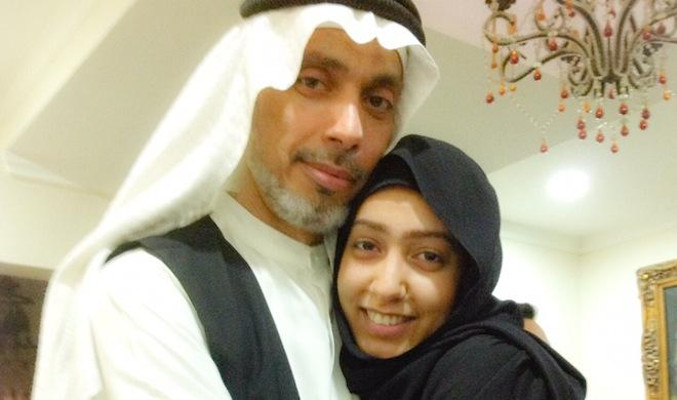23 March 2017 – The Fifth High Criminal Court in Bahrain today sentenced scholar and activist Khalil al-Halwachi to 10 years in prison. The government arrested and charged al-Halwachi with possessing weapons in 2014; he has been in pre-trial detention since that time. In addition to weapons possession, the prosecution further charged al-Halwachi with “insulting the judiciary” for raising violations during judicial proceedings in a letter to the judge. The court sentenced Khalil al-Halwachi in a case with thirteen other defendants. The judge sentenced three of those defendants to death, two of them in absentia.
We, the undersigned organizations, condemn the court’s decision today to sentence Khalil al-Halwachi to 10 years in prison on terror charges and call on the Government of Bahrain to immediately release him and drop the charges against him. We further condemn the issuance of three death penalties passed down in today’s court and call on the government to institute a moratorium on the death penalty with a view towards abolition.
The Bahraini security forces arrested al-Halwachi, a Bahraini citizen and Swedish resident, on 3 September 2014 during a house raid where they did not present a search or arrest warrant. The authorities transported al-Halwachi to the Criminal Investigations Directorate (CID) and subjected him to torture and ill-treatment to coerce a false confession from him. Authorities interrogated al-Halwachi regarding his association with then-dissolved Amal political society. The government eventually charged al-Halwachi with possessing weapons, leading to allegations of being part of a terror cell.
Throughout the trial proceedings, al-Halwachi maintained that the weapons alleged to have been in his possession were planted by Bahraini security forces. This claim, in addition to the torture of detainees to extract coerced confessions, is consistent with malfeasance and due process violations committed by Bahraini authorities in previous politically-motivated cases. In 2011, following the mass arrest of doctors, nurses, and medics for treating injured protestors, the Bahraini government similarly alleged the medical personnel had been in possession of weapons. The prosecution presented a “box” of weapons in court, saying they were found amongst the medical staff. According to the doctors’ legal counsel, “the defense objected vociferously to the presentation of the weapons in court, saying they had not been registered as evidence and had not been presented at the first trial.” During al-Halwachi’s trial, when he attempted to raise his concern regarding the unfair judicial proceedings, the authorities punished him by removing him from the courtroom and charging him with “insulting the judiciary.”
The Bahraini government has subjected al-Halwachi to pre-trial detention at Dry Dock Detention Center since his arrest. Beginning in 2014, the courts have postponed al-Halwachi’s trial more than 20 times over his two-and-a-half year detention period. During this time, al-Halwachi has not enjoyed regular access to a lawyer. While in pre-trial detention, al-Halwachi has suffered a number of different health problems, including most recently a stroke. Al-Halwachi has reportedly not received adequate medical care for his health problems and now has limited mobility as a result of the stroke. The authorities have transferred al-Halwachi to Jau Prison, and the family is reporting that he was not allowed to take any of his belongings with him.
The daughter of Khalil al-Halwachi, Fatima al-Halwachi who is the Deputy-Chairman of the European-Bahraini Organisation for Human Rights (EBOHR), commented on her father’s sentencing: “My father was a teacher who has absolutely nothing to do with the prosecution’s allegations that he is part of a terror cell. His only involvement in the case was being a private tutor for one of the other’s who was accused. The charges against him are fabricated purely for political reasons for the purpose of putting yet another forward-thinker with visions for his country behind bars. Sweden and the European Union must publicly call for my father’s release and prevent people like him from being unjustly imprisoned.”
The Government of Bahrain has contravened a number of obligations under international human rights law. Article 9 of the International Covenant on Civil and Political Rights (ICCPR) protects against arbitrary arrest and detention. It also stipulates that detainees must be brought promptly before a judge and are entitled to a trial within a “reasonable time.” Additionally, Article 14 of the ICCPR also outlines a number of due process guarantees, including “to have adequate time and facilities for the preparation of one’s defense and to communicate with counsel of one’s choosing.”
We, the undersigned organizations, condemn the sentencing of Khalil al-Halwachi to 10 years in prison. The Government of Bahrain subjected al-Halwachi to an extremely lengthy and unfair judicial process. Additionally, the Bahraini authorities have not provided al-Halwachi with adequate medical attention, leading to a drastic deterioration in his health. We call on the Government of Bahrain to immediately release al-Halwachi and to drop all charges against him. He must promptly receive adequate medical care for his health problems. Additionally, we urge the Bahraini government to end its use of capital punishment by imposing a moratorium on the death penalty.
Signed,
Americans for Democracy & Human Rights in Bahrain (ADHRB)
Bahrain Center for Human Rights (BCHR)
Bahrain Institute for Rights and Democracy (BIRD)
European Center for Democracy and Human Rights (ECDHR)





